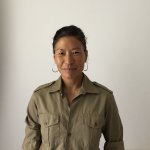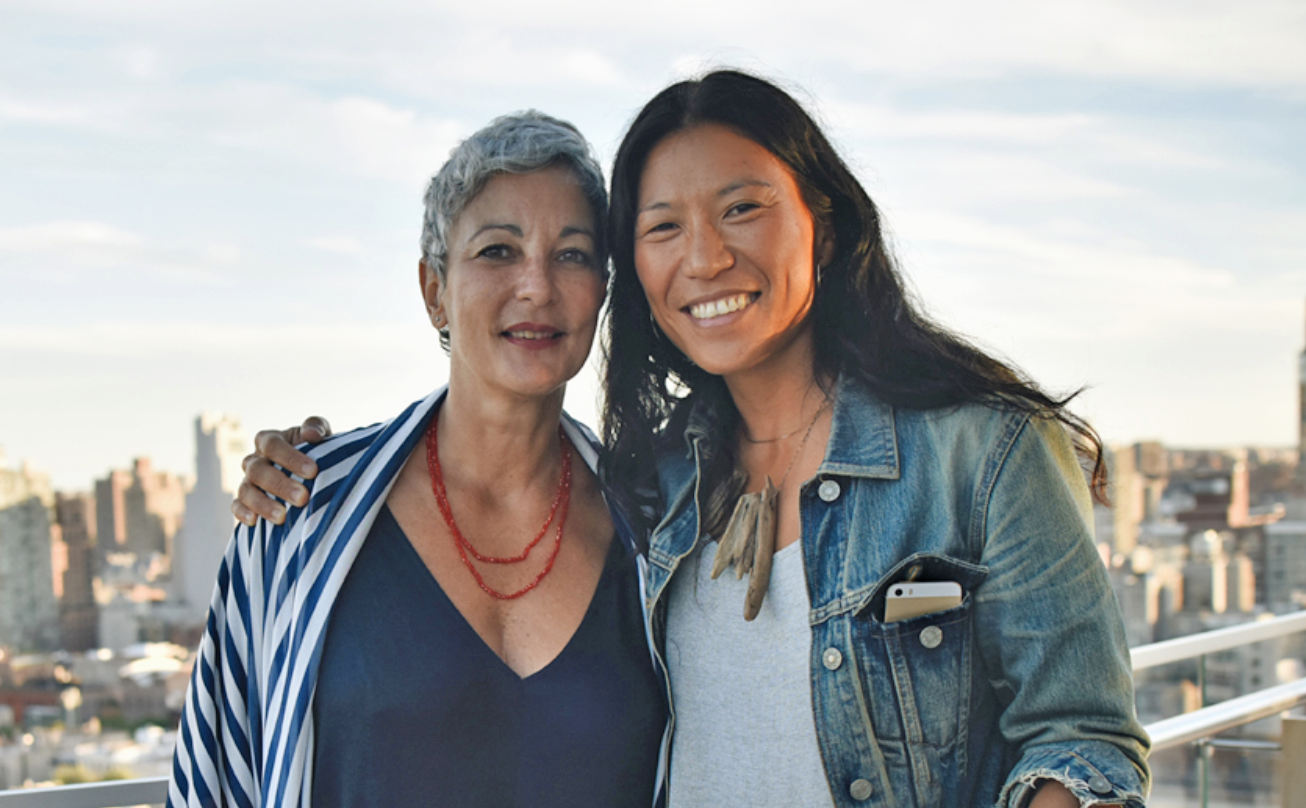Step into the electrifying realm of radical glamour, where Sundays at Café Tabac immortalizes the iconic lesbian night that lit up New York’s East Village from 1993 to 1995. A vibrant celebration of diversity and unapologetic self-expression, this unforgettable gathering not only transformed lives but also mirrored the surge of visibility that sent shockwaves through mainstream media—during a time when being seen was a matter of survival.
SYNOPSIS
It’s Sunday night, 1993, and we’re at Café Tabac—an intimate French bistro in New York’s East Village. The hum of conversation mingles with the soulful mixes of DJ Sharee Nash. The party starts early at dinner, a slow burn of clinking glasses and flirtatious glances, until the room fills up with a diverse cross-section of New York’s lesbian community. They include artists, fashionistas, activists, (the newly coined) “celesbians” and their preferred friends and family. The party’s hosts, Wanda Acosta and Sharee Nash, Nuyorican-Latina and African American respectively, inspire a distinctive energy to the night, where women of color felt especially celebrated and represented. The air is thick with cigarette smoke, laughter and possibility as the night erupts into something electric. The collective boldness of the women is so unfamiliar yet entirely infectious, that the room buzzes. It inspires, affirms and imprints an unshakeable new way of being. Word of the party travels around the world and lesbians begin to make their way there from afar. It changes lives, and those women go on to change the world. This isn’t just a party—it’s a sanctuary and an incubator.
“Sundays at Café Tabac” take us on an unforgettable journey into the heart of this fleeting yet pivotal moment in time, when this weekly gathering—during a thriving era of lesbian nightlife—became a cultural touchstone. From 1993 to 1995, this legendary lesbian night filled with head-turning fashion wasn't just a place to see and be seen—it was a vibrant, radical act of self-definition. When visibility was a matter of life and death for our community, Café Tabac provided a defiant stage for those refusing to be erased, its impact resonating far beyond the walls of this party.
Through over 60+ personal narratives of the LGBTQ+ patrons, hosts, and icons who found both refuge and revelation here (which include filmmaker/activists Maria Maggenti, Rose Troche, Guinevere Turner, Catherine Gund; models Jenny Shimizu, Eve Salvail, Patricia Velazquez; writers Jacqueline Woodson, Sarah Schulman, Linda Villarosa, Hilton Als, Michael Musto; performers Lea Delaria, Marga Gomez; musicians Meshell Ndegeocello, the band BETTY; downtown & fashion icons Patricia Field, Edwige; and so many more)—the film weaves a story of nightlife, activism, and the unprecedented surge of lesbian media representation in the early ’90s. Against the backdrop of the AIDS crisis and political battles over LGBTQ+ and women’s rights, the film is more than just about a party. It presents a front row seat to early ‘90s culture and history and shines a light on the vital yet overlooked contributions of lesbians—many among Café Tabac’s community— to these movements through organizing prowess, vision, creativity, boldness, defiance and sheer brilliance. Their impact still echoes today, despite the history books failing to acknowledge their role.
Directed and Produced by Karen Song, a Café Tabac alum, and Produced by the party’s co-host Wanda Acosta, the film blends intimate interviews with evocative fashion-forward recreations styled by Rebecca Weinberg—Emmy-winner for “Sex & The City” (with Patricia Field), animation by multi-Emmy winner Lauren Fisher, never-before-seen archives, and an original score by multi–Grammy-winning musician Meshell Ndegeocello. Edited altogether by award-winning filmmaker Rhys Ernst, the documentary pulses with the energy of an era when nightlife, activism and for the first time ever, lesbians omnipresent on mainstream magazine covers, primetime TV and the like—were inseparable.
Sunday nights at Café Tabac intrinsically is the story of VISIBILITY. Once we were able to see ourselves unapologetically be our full selves, celebrating and being celebrated by each other, it fostered a profound personal empowerment—grounded in the power of community— that each person carried out into the world. The radical glamour on display, is also a reflection of how our creative impulses can signal a challenge to the status quo, of not just survival, but a defiant and poetic celebration and expansion of one’s identity and community. “Sundays at Café Tabac” uncovers the idea that nightlife is visibility as a practice, a necessary in-person practice. And its impact can last decades after that “last call” on the night the party ended in 1995.
With the unfathomable overturning of Roe v. Wade, “Don’t Say Gay” legislation passed as LAW in Florida, school book bans and LGBTQ language, government institutions & programs, archives and libraries being disintegrated before our very eyes—where our bodies, history, rights and visibility are undeniably under attack—we can see how progress can suddenly be erased… how we can be disappeared. It is clear how important visibility is as a regular practice that we need to keep fighting for, in physical, media and virtual landscapes. It is not just a given. Visibility is just one of the many battlegrounds where we have to fight for our right to exist and for our truths, because those who control the narrative—as we witnessed in the ’80s during the AIDS epidemic—have the power to distort who we are and ultimately cause us grave harm.
As forces seek to disappear and silence our community once again, “Sundays at Café Tabac” is more than a reflection on the past—it’s a reminder of our collective strength, caring, legacy, and the spaces and world we continue to create for ourselves. Queer folks have always found a way, and part of that pathway is paved with the radical need to celebrate ourselves and our lives—together. Nightlife has long been a cornerstone of queer history and activism. The “Sundays at Café Tabac” documentary springs from this rich historical legacy. This is our history. And it’s time to bring it into the light.
ABOUT FILMMAKER(S)
 Director Karen Song
Director Karen Song
KAREN SONG (Director, Producer, Co-Creator, Editor) is a queer Korean-American director, studied in a myriad of art forms; she embodies all that a lifetime in NYC and her unique family histories have inspired. The Sunday night party at Café Tabac was important in her developmental years as a queer person, and she is honored to be able to bring the stories of this fabled event to light.
The dramatic medium of film, television, live theater and working with actors, has been her center, but her love of storytelling and motion pictures has casted her career across a wide variety of platforms. Over a decade of working in the entertainment industry, with ad-agencies, premium brands and A-list celebrities, has taken her around the globe where she has created everything from branded content, commercials, music videos, documentaries, radio ads and podcasts. Recently, she has also been credited DP/Cameraperson on the documentary feature film “Aggie,” which premiered at Sundance 2020, as well as Glamour Magazine’s “Women of the Year” profiles of Megan Rapinoe, Ava Duvernay, Tory Burch and Yara Shahidi. Throughout her career, she has also worked with various HIV/AIDS and LGBTQ-related non-profit organizations towards their various media needs, from the Red Hot Organization, Keep a Child Alive, Astraea Lesbian Foundation for Justice, The LOFT LGBTQ+ Community Center, and GLAAD. Currently she has narrative feature film and TV projects under various stages of development whilst in the final stages of post-production on “Sundays at Café Tabac.” More at www.singasongproductions.com
 Producer Wanda Acosta
Producer Wanda Acosta
WANDA ACOSTA (Producer & Co-Creator) is a stalwart icon in lesbian nightlife in downtown New York. The creator and co-host of Sundays at Cafe Tabac, she has been creating and producing events in NYC for over 25 years. She was an owner of WonderBar, Starlight, and Clubhouse in Manhattan’s East Village. She also hosted and curated events at Bar d’O, The Box, Angels and Kings, BLVD, Liquids, Clit Club. Her events garnered press in New York Magazine, The New Yorker, Harper’s Bazaar, Time Out, Out Magazine, The Advocate, and was featured in an episode of the L-Word. She has worked with a diverse range of clients and media including The New York Gay & Lesbian Film Festival, The L-Word/Showtime Networks, Tribeca Film Festival, Twist/Columbia Records, fashion/art magazine Visionaire, and non-profit organizations such as GLAAD, Empire State Pride Agenda, Astraea Foundation, Hetrick-Martin Institute, and the LGBT Center. She is a creator, producer, and editor of The Podcasts, Sundays at Café Tabac and Kiskadee.
RELATED LINKS
PROMOTE THIS PROJECT
Put a donation widget on your site. Click here for code.
ABOUT YOUR DONATION
Women Make Movies (WMM), Inc. is a 501(c)(3) non-profit media arts organization registered with the New York Charities Bureau of New York State and accepts charitable donations on behalf of this project. Your donation will be spent by the filmmaker(s) toward the production and completion of this media project. No services or goods are provided by Women Make Movies, the filmmaker(s) or anyone else associated with this project in exchange for your charitable donation.
Your contributions are tax deductible to the fullest extent of the law, and a confirmation of your donation will be sent via email. WMM will send you an acknowledgement letter in the mail to the address listed for tax purposes.
